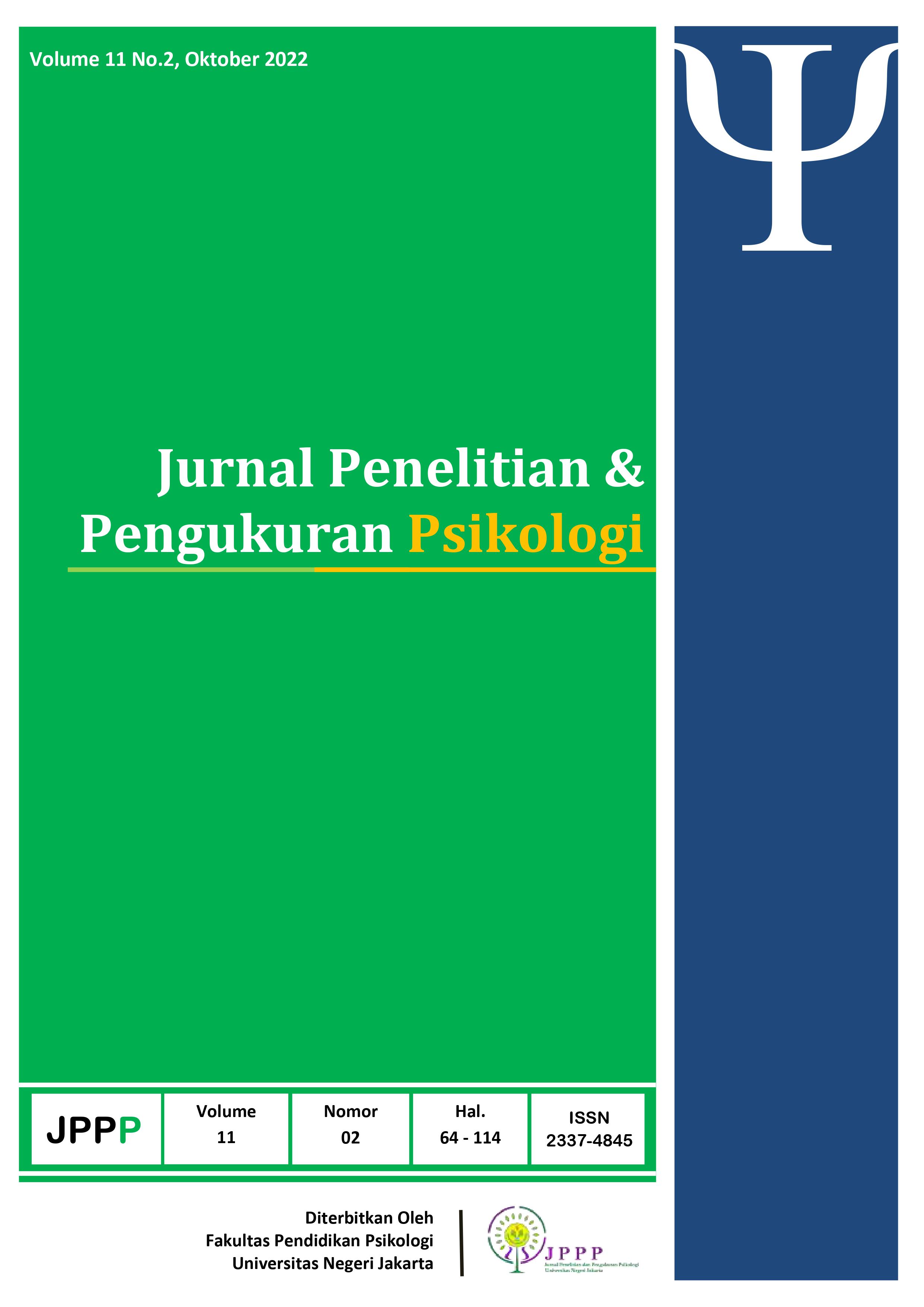Pros and Cons Conducting Online Experimental Research in Psychology
DOI:
https://doi.org/10.21009/JPPP.112.01Keywords:
daring, eksperimental, kontra, proAbstract
-
References
Birnbaum, M. (2004). Human research and data collection via the internet. Annual Review of Psychology, 55, 803–832.
Bosnjak, M., & Tuten, T. L. (2003). Prepaid and Promised Incentives in Web Surveys. Social Science Computer Review, 21(2), 208–217. https://doi.org/10.1177/0894439303251569
Chandler, J., Mueller, P., & Paolacci, G. (2014). Nonnaïveté among Amazon Mechanical Turk workers : Consequences and solutions for behavioral researchers. 112–130. https://doi.org/10.3758/s13428-013-0365-7
Concordia St. Paul University. (n.d.). What is experimental psychology? Concordia St. Paul University. Diambil 14 September 2022, dari https://online.csp.edu/resources/article/what-is-experimental-psychology/
Dandurand, F., Shultz, T. R., & Onishi, K. H. (2008). Comparing online and lab methods in a problem-solving experiment. Behavior Research Methods, 40(2), 428–434. https://doi.org/10.3758/BRM.40.2.428
Finley, A., & Penningroth, S. (2015). Online versus In-lab: Pros and Cons of an Online Prospective Memory Experiment. Advances in Psychology Research Volume, 113(October), 135–162.
Gravetter, F. J., & Forzano, L.-A. B. (2012). Research Method for Behavioural Science.
Huber, B., & Gajos, K. Z. (2020). Conducting online virtual environment experiments with uncompensated, unsupervised samples. PLoS ONE, 15(1), 1–17. https://doi.org/10.1371/journal.pone.0227629
Ilieva, J., Baron, S., & Healey, N. M. (2002). Online surveys in marketing research : pros and cons. International Journal of Market Research, 44(3), 361–376.
Kraut, R., Olson, J., Banaji, M., Bruckman, A., Cohen, J., & Couper, M. (2004). Psychological Research Online: Report of Board of Scientific Affairs’ Advisory Group on the Conduct of Research on the Internet. American Psychologist, 59(2), 105–117. https://doi.org/10.1037/0003-066X.59.2.105
Mayrhofer, R., Kuhbandner, C., & Lindner, C. (2021). The Practice of Experimental Psychology: An Inevitably Postmodern Endeavor. Frontiers in Psychology, 11(January). https://doi.org/10.3389/fpsyg.2020.612805
Oppenheimer, D. M., Meyvis, T., & Davidenko, N. (2009). Instructional manipulation checks: Detecting satisficing to increase statistical power. Journal of Experimental Social Psychology, 45(4), 867–872. https://doi.org/10.1016/j.jesp.2009.03.009
Reinecke, K., Arbor, A., & Gajos, K. Z. (2015). LabintheWild : Conducting Large-Scale Online Experiments With Uncompensated Samples. https://doi.org/10.1145/2675133.2675246
Reips, U.-D. (2000). The web experiment: Advantages, disadvantages, and solutions. Psychology experiments on the Internet, January 2000, 89–117. https://doi.org/10.5167/uzh-19760
Reips, U. (2002). Standards for Internet-Based Experimenting. Erschienen in: Experimental Psychology, 49(4), 243–256. https://doi.org/10.1026//1618-3169.49.4.243
Reips, U. D. (2012). The methodology of Internet-based experiments. Oxford Handbook of Internet Psychology, 9780199561, 1–26. https://doi.org/10.1093/oxfordhb/9780199561803.013.0024
Wright, K. B. (2006). Researching Internet-based Populations: Advantages and Disadvantages of Online Survey Research, Online Questionnaire Authoring Software Packages and Web Survey Services. Journal of Computer-Mediated Communication, 10(3).
Bosnjak, M., & Tuten, T. L. (2003). Prepaid and Promised Incentives in Web Surveys. Social Science Computer Review, 21(2), 208–217. https://doi.org/10.1177/0894439303251569
Chandler, J., Mueller, P., & Paolacci, G. (2014). Nonnaïveté among Amazon Mechanical Turk workers : Consequences and solutions for behavioral researchers. 112–130. https://doi.org/10.3758/s13428-013-0365-7
Concordia St. Paul University. (n.d.). What is experimental psychology? Concordia St. Paul University. Diambil 14 September 2022, dari https://online.csp.edu/resources/article/what-is-experimental-psychology/
Dandurand, F., Shultz, T. R., & Onishi, K. H. (2008). Comparing online and lab methods in a problem-solving experiment. Behavior Research Methods, 40(2), 428–434. https://doi.org/10.3758/BRM.40.2.428
Finley, A., & Penningroth, S. (2015). Online versus In-lab: Pros and Cons of an Online Prospective Memory Experiment. Advances in Psychology Research Volume, 113(October), 135–162.
Gravetter, F. J., & Forzano, L.-A. B. (2012). Research Method for Behavioural Science.
Huber, B., & Gajos, K. Z. (2020). Conducting online virtual environment experiments with uncompensated, unsupervised samples. PLoS ONE, 15(1), 1–17. https://doi.org/10.1371/journal.pone.0227629
Ilieva, J., Baron, S., & Healey, N. M. (2002). Online surveys in marketing research : pros and cons. International Journal of Market Research, 44(3), 361–376.
Kraut, R., Olson, J., Banaji, M., Bruckman, A., Cohen, J., & Couper, M. (2004). Psychological Research Online: Report of Board of Scientific Affairs’ Advisory Group on the Conduct of Research on the Internet. American Psychologist, 59(2), 105–117. https://doi.org/10.1037/0003-066X.59.2.105
Mayrhofer, R., Kuhbandner, C., & Lindner, C. (2021). The Practice of Experimental Psychology: An Inevitably Postmodern Endeavor. Frontiers in Psychology, 11(January). https://doi.org/10.3389/fpsyg.2020.612805
Oppenheimer, D. M., Meyvis, T., & Davidenko, N. (2009). Instructional manipulation checks: Detecting satisficing to increase statistical power. Journal of Experimental Social Psychology, 45(4), 867–872. https://doi.org/10.1016/j.jesp.2009.03.009
Reinecke, K., Arbor, A., & Gajos, K. Z. (2015). LabintheWild : Conducting Large-Scale Online Experiments With Uncompensated Samples. https://doi.org/10.1145/2675133.2675246
Reips, U.-D. (2000). The web experiment: Advantages, disadvantages, and solutions. Psychology experiments on the Internet, January 2000, 89–117. https://doi.org/10.5167/uzh-19760
Reips, U. (2002). Standards for Internet-Based Experimenting. Erschienen in: Experimental Psychology, 49(4), 243–256. https://doi.org/10.1026//1618-3169.49.4.243
Reips, U. D. (2012). The methodology of Internet-based experiments. Oxford Handbook of Internet Psychology, 9780199561, 1–26. https://doi.org/10.1093/oxfordhb/9780199561803.013.0024
Wright, K. B. (2006). Researching Internet-based Populations: Advantages and Disadvantages of Online Survey Research, Online Questionnaire Authoring Software Packages and Web Survey Services. Journal of Computer-Mediated Communication, 10(3).
Downloads
Published
2022-10-24
Issue
Section
Articles







